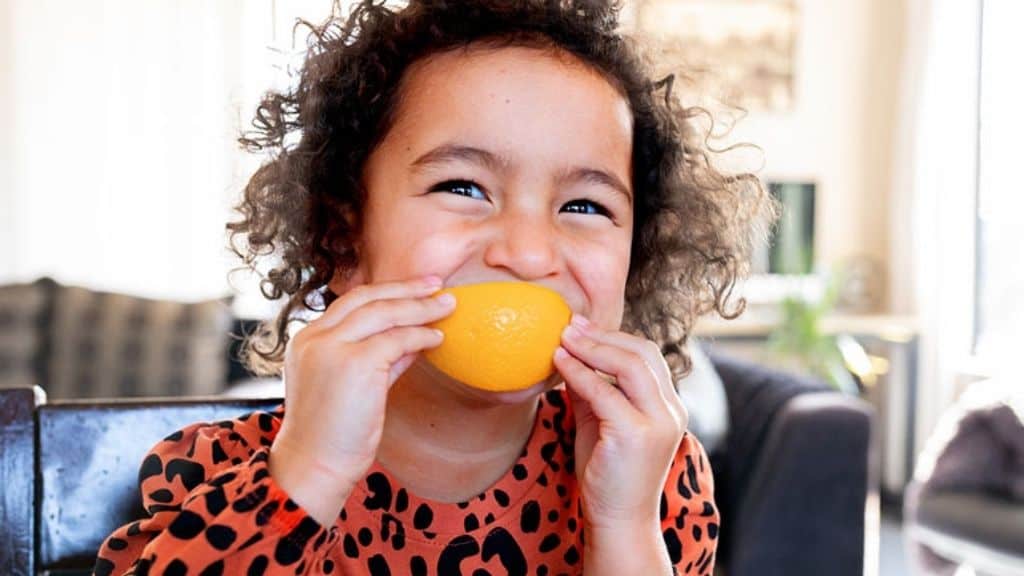
Table of Contents
As parents, you must’ve found yourself going to great lengths to ensure that your munchkin is healthy. However, what most of us fail to understand is that your baby’s health isn’t just about enforcing excellent hand washing habits, sleep schedules, and exercise, but ensuring that your little one has a strong immune system is another important factor in keeping them healthy.
According to a survey performed by the Centers for Disease Control and Prevention, up to 6% of children over the age of 6 in America may have a vitamin C deficiency. But how much vitamin C per day for kids is recommended and how much vitamin is too much vitamin?
You can simply guarantee that your child gets enough vitamin C to stay healthy with a little study, education, and help from things like supplements. Let’s read about the right vitamin C for babies and kids and other related facts.
Can Kids Take Vitamin C?
Vitamin C is a water-soluble vitamin that is required for our bodies to operate properly. However, since it is water-soluble, the human body is unable to generate or store it. Therefore, you must acquire consistent quantities of this crucial vitamin from outside sources daily.
Vitamin C is available in enough foods that, usually, children might obtain enough from their diet alone. Supplementing Vitamin C, on the other hand, has been demonstrated to have substantial advantages for the immune system and overall health, both during early development and well into adulthood.
But the question remains: why does your little one need vitamin C? How much vitamin C can a 5-year-old take?
Why Does Your Baby Need Vitamin C?
Vitamin C for babies is a potent antioxidant that has a wide range of health advantages. Its relationship to the immune system is perhaps its most well-known feature. It’s critical to understand the relationship between Vitamin C and your child’s health, especially now that a strong immune system is more necessary than ever owing to concerns about Coronavirus.
Vitamin C also aids in the production of white blood cells, necessary for a healthy immunological response. Lymphocytes and phagocytes are white blood cells that assist in identifying “foreign” material in the body that could be harmful and killing it as needed. Vitamin C is an antioxidant, which means it protects these cells from free radicals that cause oxidative stress.
When the body is under oxidative stress, it becomes inflamed, making it more vulnerable to diabetes, asthma, and inflammatory illnesses. Vitamin C not only aids in the production of white blood cells, but it also aids in their protection so that they may do their job successfully.
Mammas need their vitamins too to birth perfect little humans! Here’s a list of the best prenatal vitamins!
How Much Vitamin C for Kids is Ideal?
Another advantage of Vitamin C is that it is relatively non-toxic at higher doses, with little risk of overdosing. But how much vitamin C per day for kids is the right amount? Depending on the age of your little one, there are dietary recommendations for vitamin C for babies and kids:
Age Group | Vitamin C Requirement (mg per day) |
1 to 3 years | 14 mg |
3 to 8 years | 25 mg |
8 to 13 years | 45 mg |
14 to 18 years | 65 mg (for female) |
75 mg (for male) |
It is believed that having increased quantities of vitamin C can help avoid the common cold, which is a popular claim concerning vitamin C. When your baby has a sore throat, you might instinctively go for an orange. However, multiple studies have shown that taking a vitamin C supplement does not protect your baby from catching a cold. If anything, it may shorten the duration of your illness or make your symptoms milder, but this isn’t the case if you start boosting your Vitamin C intake after you’ve already caught a cold.
Now that we know how much vitamin C per day for kids is required, let’s take a look at how much vitamin in too much vitamin!
Tolerable Upper Intake Level of Vitamin C Dose For Kids
The Food and Nutrition Board has established tolerated upper intake levels for each age group of children.
| Age Group | Upper Limit Of Vitamin C (mg per day) |
| 3 to 8 years | 650 mg |
| 8 to 13 years | 1,200 mg |
| 14 to 18 years | 1,800 mg |
Note: The upper limit is the maximum daily amount of a nutrient that a child can take without suffering potentially hazardous side effects. Are you a vegan parent and want your kids to follow a plant-based diet? Here’s an article on whether plant-based diets are good for children!
Deficiency of Vitamin C For Kids
Here’s a piece of good news for you: Deficiency of vitamin C is very rare in the United States. Vitamin C for babies and kids is low in developing or poorer countries, where they have much less intestinal absorption or unhealthy eating habits that leave out vitamin C sources.
Special blood tests are required to diagnose vitamin C deficiency. However, the most common complication of vitamin C deficiency is scurvy.
The symptoms of scurvy are:
- Bleeding from mucus membranes
- Dark spots on the skin
- Hardened gum
- Rough skin
Other common symptoms include weakness, bone pain, poor wound healing, as well as mood changes, and, in the latter stages, convulsion, nervous disorder, and jaundice.
Source Of Vitamin C For Kids
The body of your growing toddler is unable to create vitamin C on its own. As a result, as a parent, you must ensure that your child consumes an extensive mix of colored fruits and veggies daily (easier said than done, right?) But the good thing is that vitamin C can be found in a variety of sources. Let’s take a look at the best sources of vitamin C for toddlers and babies:
| Source | Vitamin C (in mg) per 100 gm |
| Broccoli | 89 mg |
| Bell peppers | 128 mg |
| Grapefruits | 31 mg |
| Guavas | 228 mg |
| Kiwi | 93 mg |
| Oranges | 53 mg |
| Papayas | 61 mg |
| Strawberries | 59 mg |
| Tomatoes | 23 mg |
But if your child is a fussy eater, you can also discuss vitamin C dosage for kids as supplements.
Supplementary Vitamin C For Kids
You shouldn’t try to provide vitamin C for kids as supplements without consulting a doctor. Why is this so? Some supplements may contain enough vitamin C to be hazardous to children. Also, you must remember that nutritional supplements are never a replacement for fresh fruits and vegetables in your child’s diet.
The US Food and Drug Administration (FDA) does not regulate non-prescription vitamin C supplements, and they are not tested for purity or safety.
If your child’s doctor suggests vitamin C supplements, search for brands with the “USP-Verified” symbol on the package. These symbols denote that the manufacturer’s products have been tested by the United States Pharmacopeia, a non-profit organization that assures supplements are free of chemicals and heavy metals.
Side Effects Of Vitamin C For Kids
Even high doses of vitamin C are considered safe to consume. However, few may encounter minor side effects, such as
- Abdominal pain
- Bloating
- Diarrhea
- Gas
- Nausea
- Stomach cramps
Your child may get stomach irritation and kidney stones if they consume more vitamin C than the prescribed upper limit. Vitamin C supplements can also interfere with the effectiveness of pharmaceuticals such as
- Acetaminophen
- Aspirin
- Nonsteroidal anti-inflammatory drugs like warfarin, tetracycline, and ibuprofen
- Barbiturates like chemotherapy and phenobarbital drugs.
Vitamin C supplements should be avoided by children who are also receiving
- Copper
- Iron supplements
- Vitamin B-12
Before using vitamin C, inform your child’s pediatrician of all medicines and supplements that your little one is currently taking.
A Final Word on Vitamin C For Kids
Considering how safe and affordable vitamin C is, it may be okay to give your child a short course of vitamin C during a cold – but consult with your child’s doctor first. However, instead of relying on supplements, choose fruits and veggies that are rich in vitamin C, such as oranges, broccoli, guavas, kiwi, tomatoes, strawberries, and so on! Well, unlike the common saying, it is safe to say: an orange a day keeps the doctor away!
FAQs: Vitamin C For Kids
1) Is 500mg of vitamin C too much for a child?
2) How much vitamin C for kids is harmful?
3) How much vitamin C is per day for kids?
4) What are the sources of vitamin C?
5) Does Vitamin C have any side effects?
Sources:
On behalf of the editorial team at Parenthoodbliss, we follow strict reporting guidelines and only use credible sources, along with peer-reviewed studies, academic research institutions, and highly respected health organizations. To learn about how we maintain content accurate and up-to-date by reading our medical review and editorial policy.










